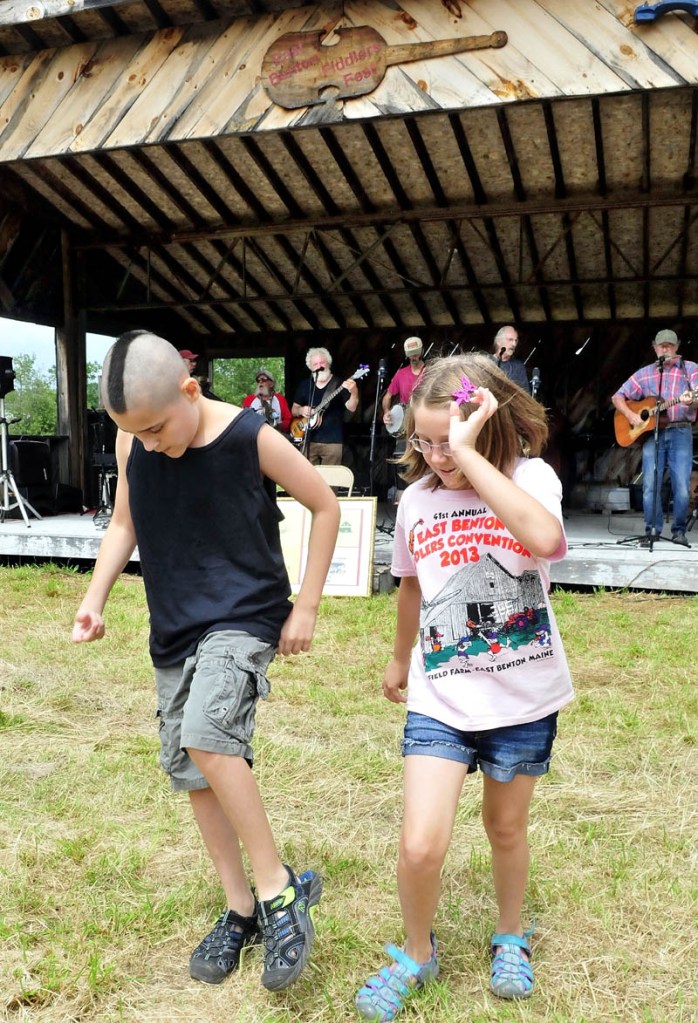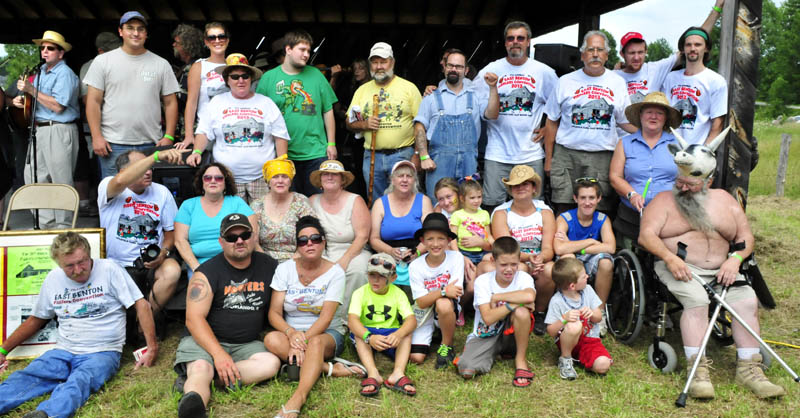BENTON — A loud, proud crowd of fiddle enthusiasts gathered at a family farm today to stomp their feet and draw their bows during the 41st annual East Benton Fiddler’s Contest, Convention and Bluegrass Festival.
The family of co-founder Shirley Littlefield, a mother of nine who died in 2004, is working to carry on a 41-year tradition of warmth, acceptance and willful individuality.
The crowds of attendees have shrunk from their peak in decades gone by, but the unique atmosphere of fiddler culture, characterized by a raucous good cheer, was on full display in the warmth of the early afternoon.
On the stage, which was adorned with bleached steer skulls and handmade wooden signs, as many as 20 performers from different backgrounds and generations gathered to play music that was long on enthusiasm and short on precision, part of fiddling’s inclusive appeal.
Among the performers was Eric Rolfson, a fixture at the festival for 40 years, wrestling with a giant bass fiddle. To his right, his young granddaughter, Aura, kept time on her own small fiddle, while his daughter, Bridget, blew the harmonica.
Rolfson and his descendants are an example of the power of the fiddle to unite families and generations, said Rosie McManus, Shirley Littlefield’s oldest child and the event manager.
McManus spoke from the event headquarters, an old painted bus that, in the ’80s, served as the sleeping quarters for oxen and Littlefields at state and county fairs.
The fiddler’s festival drew about 400 people in its first year, 1972, after which the number of attendees exploded. By 1982, there were more that 3,500 attendees, significantly more than last year, when a bout of bad weather helped drive attendance down to about 550.
The popularity of the fiddling scene has ebbed and flowed like the fluctuating intonations of a bluegrass yodeler, McManus said, resulting not in a decline, but in a cycle.
And while the total number of spectators has gone down, she has seen the number of active participants go up over the past 10 years.
“I see more and more people coming in with their own fiddles,” she said.
McManus said she wasn’t pinning the success of this year’s festival, which charges $10 a head and lasts until sundown, on a particular number of attendees.
“I’m happy to see however many come,” she said.
She admits to running the event with a different management style than that of her mother.
“I’m more unforgiving than she was,” she said. “When people say they’re going to do something, then they should do it.”
That philosophy didn’t stop her from dispensing hugs and well-wishes to many of the familiar faces streaming past to take their place among the fiddle enthusiasts or from clapping along enthusiastically to the beat of the music.
Away from the bandstand, those in attendance listened appreciatively, their own strong independent streak on full display, as when they laughed heartily at a performer’s comment about having spent time in jail.
The men, just as likely to have a beer in their hand as a shirt on their back, never strayed far from coolers, some of them housed in wooden-walled red wagons or wheelbarrows that doubled as seating.
A short row of vendors offered food, drinks and, for $2, terrorist hunting licenses.
Gerry Moody, a young boy sporting a mohawk, stomped out an enthusiastic jig in front of the stage. He was joined for a second round by his younger sister, Angel. While the musicians accompanied them with guitars, banjos, a washboard and tin cans, those watching encouraged them with yodels, whoops, clapping and stomping.
Samantha Davis, of Montville, sitting on a blanket next to a new friend, said she plans to take up the fiddle eventually. She moved to Maine recently from Florida, she said, where bluegrass music was a family affair, back at least to her grandmother, who played, Davis said, a mean set of spoons.
It’s hard to describe the particular appeal of fiddles, she said, which have a feel of natural authenticity to them.
“It’s an organic love that’s spread from instrument to instrument,” she said.
Around the edges of the field, others tossed plastic discs to each other or set up lawn chairs and blankets in the shade offered by the tree line.
One man wore a helmet in the shape of a bull’s head, complete with horns, while a woman carried around a large clear container, offering pineapple chunks on a metal ladle to friends and relatives.
Matt Raven, an Albion resident, said he’s come to the festival a handful of times, but this was his first visit in about six years. He wanted to bring his 18-month-old son, Mason, to enjoy the music.
He doesn’t play himself, he said, but he enjoys listening to fiddle music on Pandora, an Internet-based radio site that plays the genre of the user’s choice.
Area resident Robert Mitchell said the number of active fiddle enthusiasts may have gone down, but that, with the support of people like the Littlefield family, it will never go away completely.
“There’s always going to be people that like it,” he said. “And there’s always going to be people that don’t like it.”
In other words, the size of the gathering doesn’t matter, or at least not to this proud, fiercely individual fiddling community that gathers to make music together in a warm farm pasture every July.
Matt Hongoltz-Hetling — 861-9287
mhhetling@centralmaine.com
Send questions/comments to the editors.




Success. Please wait for the page to reload. If the page does not reload within 5 seconds, please refresh the page.
Enter your email and password to access comments.
Hi, to comment on stories you must . This profile is in addition to your subscription and website login.
Already have a commenting profile? .
Invalid username/password.
Please check your email to confirm and complete your registration.
Only subscribers are eligible to post comments. Please subscribe or login first for digital access. Here’s why.
Use the form below to reset your password. When you've submitted your account email, we will send an email with a reset code.